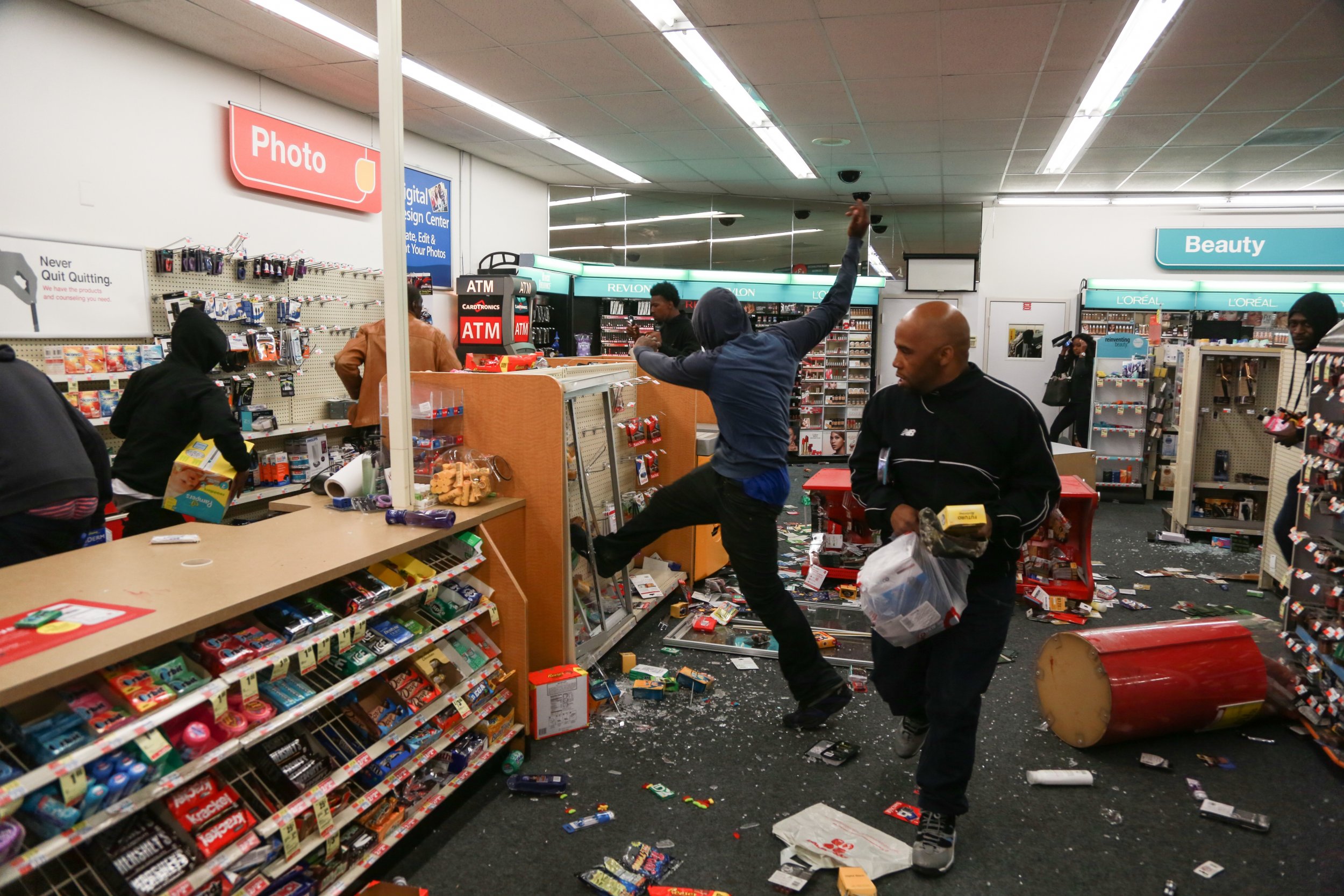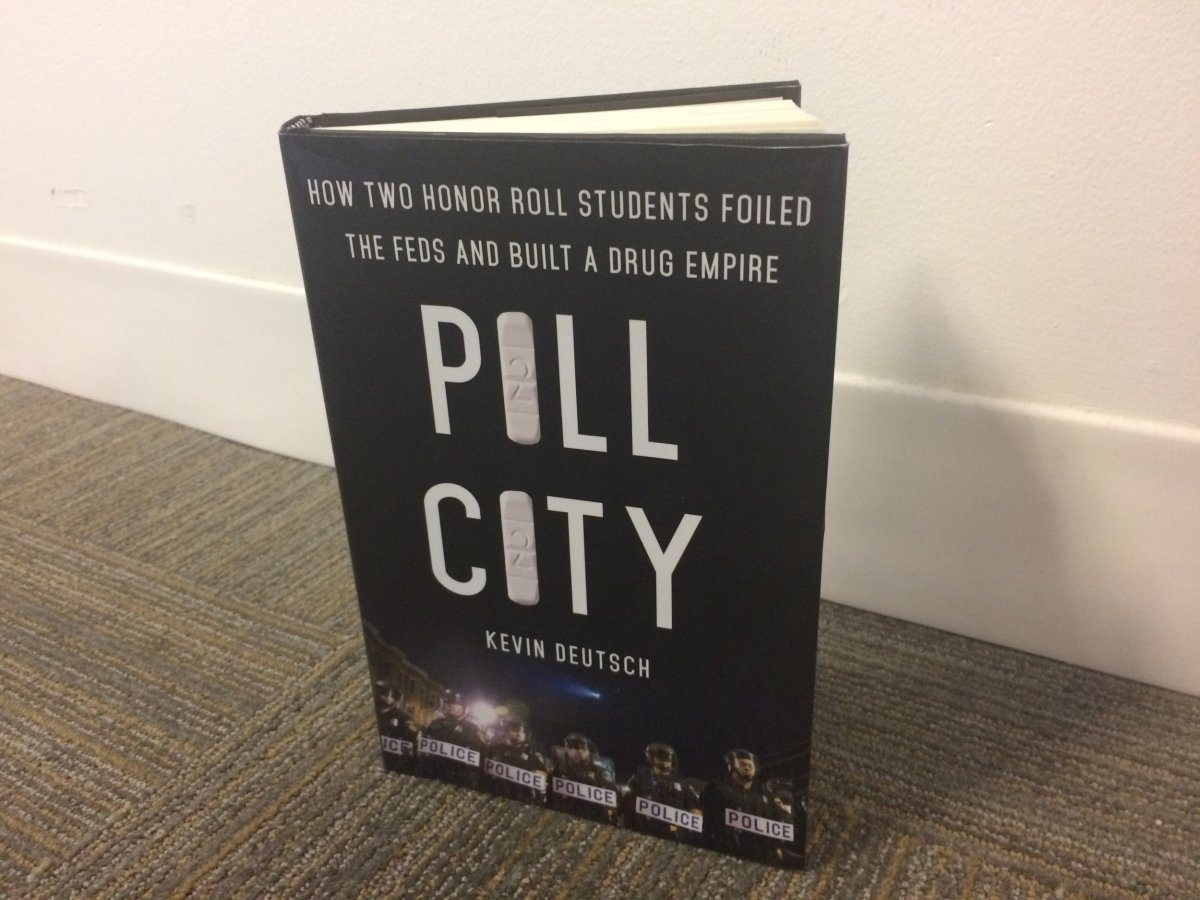
Less than two years ago, during the Baltimore riots over the death of Freddie Gray, a former Bloods gang member texted crime reporter Kevin Deutsch: "Shit's going down in B'more, son. Get down here as soon as you can." Deutsch sped south from Queens on I-95 into a lawless city, where he was handed a remarkable tip from the same ex-Blood. Two tech-savvy 18-year-olds from the projects, the pigeon-toed Brick and the pot-bellied Wax, had masterminded a plan to loot pharmacies and rival drug dealers with the Silicon Valley–inspired goal to disrupt and dominate the illegal drug market in Baltimore.
The veteran reporter made contact with Brick and Wax and began to report on their syndicate, Pill City, and its alliance with the powerful Black Guerilla Family gang. What he found was a sophisticated operation that aimed to "hack the corners" with a new sales platform and business model inspired by tech titans like Facebook and Google. "About two weeks after the riots, I realized this had no precedent in terms of a pharmacy robbery spree," Deutsch tells Newsweek. "I said to myself, 'This is a big fucking story.'"
Deutsch is relentless. Hoping to land a story in 2015, he let Gray's barber cut his hair and ended up with a horrifying fade he had to buzz to the scalp a few days later. I've seen him sprint out of a Bronx courthouse after a defendant's mom to get a quote, and he spent a year with Long Island gang members for his 2014 book The Triangle about a war between the Bloods and the Crips. For his new book, Pill City: How Two Honor Roll Students Foiled the Feds and Built a Drug Empire, he took a two-month leave from Newsday and stayed in cheap Baltimore hotels or Airbnb rentals every weekend for about a year. When his work on Pill City began, he was engaged to his high school sweetheart, but the couple split up while he was doing his reporting for the book. "Sometimes you have to choose between the relationship and the story," he says. "In this case, I chose the story."
Pill City deftly touches a range of national issues as it sings the ballad of Brick and Wax, including urban crime, addiction, race, mental health, sexual abuse, encryption, entrepreneurship and the tech industry. Both teens were raised by heroin-addicted mothers and met as 10-year-olds when both of their moms brought them to a shooting gallery. They bonded there over the autobiography of the pimp Iceberg Slim, which they read huddled side by side among the addicts, but they soon shifted their focus from books to technology.
Brick and Wax quickly mastered software design and simple hacking, and followed news of tech developments and Silicon Valley millionaires on television and in The Wall Street Journal. "We admired the tech companies who'd made their money legally, but we knew even legitimate companies have to…get in the gutter and do dirty shit on occasion. Behind every great fortune's a crime, right?" Brick says in the book, paraphrasing the French writer Honoré de Balzac and The Godfather. "If those white boys can do it, why not us?" the teens figured, as they mastered multiple coding languages and wrote a program that tracked their grades and homework assignments.
When Freddie Gray was killed while being transported in a police van in April 2015, Brick and Wax—who were friendly with Gray—finally saw their opportunity to apply their computer skills towards the most profitable economy available to them: illegal narcotics. Fueled by Red Bull and Mountain Dew and listening to Kanye West and Lil Wayne, the teens went on a coding blitz to design a business that would disrupt the archaic supplier-to-middleman-to-dealer model. "In the end, the program they built blended the mapping and dispatch features of Uber's ride-hailing app with the secrecy of encrypted drug markets like Silk Road, a combination meant to leave law enforcement befuddled, customers satisfied and competitors overwhelmed," Deutsch writes.
The teens—who geekily tucked their dress shirts into their khakis—had a system, but they still needed a product to sell. So they put together an "investor pitch," and as the riots over Gray's death began they sold the idea to Brick's cousin, a field marshal with the Black Guerilla Family gang. When the city's mayor announced a weeklong curfew and the governor called in the National Guard, the young entrepreneurs and their new gang allies used the chaos as cover to loot a total of about 50 pharmacies and rival gang-controlled stash houses.
"Brick and Wax—drawing on their electronics expertise—burglarized drugstores with more advanced security systems," writes Deutsch, adding that the pair even slipped on black ski masks and wielded handguns as they ran into a burning pharmacy to fill trash bags with prescription drugs. About one-third of all the city's pharmacies were looted during the riots, the Drug Enforcement Administration said last year, though Deutsch notes that dozens of looters unconnected to Pill City also stole property during the riots. Looking at a pile of Oxycontin, fentanyl and heroin stored at Pill City's main stash house after the riots, Wax voiced his doubt they could sell all of it. "This is the United States of Addiction," Brick retorted. "We'll definitely sell all this."
Deutsch reports in close detail the long story of how Brick and Wax—who he agreed not to identify by their real names—went from nerds obsessing over electronics at their local library to kingpins who orchestrated a national drug network that distributed drugs into cities from Cincinnati to Los Angeles and even partnered with a subsidiary of El Chapo's Sinaloa Cartel.

As the book describes their rise and how the teens dragged the drug business into the mobile era, Deutsch also argues that opiate addiction in black areas has been vastly underreported when compared to the blanket coverage of white addicts. In the chapter "Boulevards of Pain," he watches a 23-year-old woman shoot up with looted Oxycotin in a roach-infested West Baltimore rowhouse as her young son asks when they can leave. "Not yet, love," she answers. "Mommy's very busy."
Another new issue Deutsch explores in the book is encryption, which is a core part of Brick and Wax's program. (Encrypted messages were also the only way the pair would communicate with Deutsch, other than face-to-face meetings. Deutsch notes that earlier on the same day we spoke, President Trump's nominee for CIA director, Representative Mike Pompeo, was being questioned about encryption in his Senate confirmation hearing. "I think encryption is the present and future of drug dealing and it's imperative that law enforcement makes that a priority," Deutsch tells Newsweek. "There's a way for drug dealers to hide their footsteps if they're smart enough, and a lot of them are."
But leaving aside the national and political issues, the gritty human drama in Pill City has enough layers and drama to make a great movie or series, complete with two nerds from the projects pulling down $5 million and a climax both violent and redemptive. Mr. Scorsese? Mr. Simon? Mr. Fuqua? You can buy Pill City starting on Tuesday.
Uncommon Knowledge
Newsweek is committed to challenging conventional wisdom and finding connections in the search for common ground.
Newsweek is committed to challenging conventional wisdom and finding connections in the search for common ground.
About the writer
Josh Saul is a senior writer at Newsweek reporting on crime and courts. He previously worked for the New York ... Read more
To read how Newsweek uses AI as a newsroom tool, Click here.








